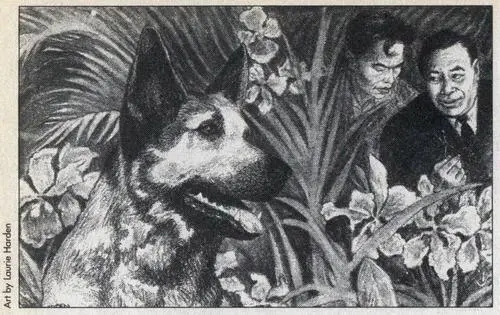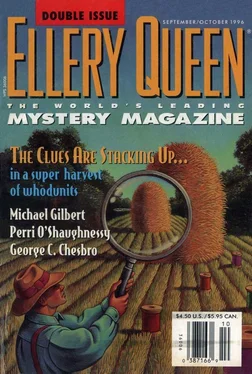Doug Allyn - v108 n03-04_1996-09-10
Здесь есть возможность читать онлайн «Doug Allyn - v108 n03-04_1996-09-10» весь текст электронной книги совершенно бесплатно (целиком полную версию без сокращений). В некоторых случаях можно слушать аудио, скачать через торрент в формате fb2 и присутствует краткое содержание. Город: Dell Magazines, Год выпуска: 1996, Издательство: Dell Magazines, Жанр: Детектив, на английском языке. Описание произведения, (предисловие) а так же отзывы посетителей доступны на портале библиотеки ЛибКат.
- Название:v108 n03-04_1996-09-10
- Автор:
- Издательство:Dell Magazines
- Жанр:
- Год:1996
- Город:Dell Magazines
- ISBN:нет данных
- Рейтинг книги:4 / 5. Голосов: 1
-
Избранное:Добавить в избранное
- Отзывы:
-
Ваша оценка:
- 80
- 1
- 2
- 3
- 4
- 5
v108 n03-04_1996-09-10: краткое содержание, описание и аннотация
Предлагаем к чтению аннотацию, описание, краткое содержание или предисловие (зависит от того, что написал сам автор книги «v108 n03-04_1996-09-10»). Если вы не нашли необходимую информацию о книге — напишите в комментариях, мы постараемся отыскать её.
v108 n03-04_1996-09-10 — читать онлайн бесплатно полную книгу (весь текст) целиком
Ниже представлен текст книги, разбитый по страницам. Система сохранения места последней прочитанной страницы, позволяет с удобством читать онлайн бесплатно книгу «v108 n03-04_1996-09-10», без необходимости каждый раз заново искать на чём Вы остановились. Поставьте закладку, и сможете в любой момент перейти на страницу, на которой закончили чтение.
Интервал:
Закладка:
Yes, I knew. I knew the demon and I knew its devil’s pact: escape. As I had escaped into the world of the goy , the non-Jew, into the police force, into the arms of women, and into restaurants that served pork and milk together, and my parents had mourned me as dead — as I had so escaped, so had he. He had taken a more courageous step, mourned as dead because he was dead. Dead, I was now sure, by his own hand.
But how? No suicide note, no murder weapon — how could someone shoot himself in the head and conceal the murder weapon with such skill?
The answer lay in this study, it had to. This was his home, his abode, his haven, and his prison. Someplace here, there was a clue, there had to be. I searched again, crawled along the floor, peered in every corner. Nothing.
Desk drawers: nothing. Floor: nothing. Bookshelves: nothing.
I sat down again, moving things around on the desk. If I were Rabbi Weissman, and I was tense, beleaguered, strung out, persecuted, what would I do? Where would I turn? Not to prayer; God had abandoned me, had abandoned six million of my brethren. Not to the holy books; they held nothing but torment.
Then I remembered what the Modern Son had said. Whenever his father needed to relax, he read Sherlock Holmes.
There was a bookmark in Sherlock Holmes and I opened to the story “The Problem at Thor Bridge.”
And there, in the story, was the answer. No suicide note needed. The story was enough. A suicide plan right there, all laid out.
Like the woman in the story, Rabbi Weissman had a gun. Who knows where he got it? It really didn’t matter. He had tied a string to the gun, weighed it down with a rock which he hung out of the window. Immediately after shooting, he let go and the gun was whisked out of the window, away, away, into the muddy pond below.
So I went. Schwartz the desanctified Jew who knew exactly what to do, I went there.
And saw the pond yield its muddy evidence, then, as I dragged it, and that terrible testimony surfacing.
The gun, complete with string and rock.
Suicide.
But, oh, the shame and stigma of a suicide in the Orthodox community. The rabbi’s grave would have to be dug up so he could be buried outside the cemetery, outside the community, a sign of his sin, that he had disposed of himself, damaged a life and a body not his own but God’s. His secret wrenched and paraded before the congregation, the merciless light of truth glaring upon his remains, upon the remains of his widow, his children, upon the ruins of their temple of memory and faith.
But that is not what happened, because it was not what I decided I would tell them.
Instead, this: Let this crime be filed as unsolved (another rabbinic dictum rising to the surface, evidence muddy but unmistakable: “One can alter the truth for the sake of peace.”). Let MacAllister grumble, let the rebbetzin mutter about police incompetence, but let the dead remain buried intact, let the living hold on to their illusions.
And so I entered that house of mourning, that shivah, again, the mourners flanked by congregants who parted as the waters of the Red Sea to let me through.
“No answers,” I told them, the sobbing rebbetzin, the somber sons, the murmuring congregants. “Hit-and-run driver makes the most sense. We’ll never know.”
She nodded, they all nodded, then shook their heads, a swell of Yiddish and Hebrew and Aramaic growing louder, louder, until the earlocked son glanced at his watch. He stood up. “Mincha!” he announced. “Time for afternoon prayer.”
The women took off like frightened rabbits while the earlocked son did a count. “Seven, eight, nine... not enough for a minyan.” Not enough for a prayer quorum, which requires ten adult men. He turned to me. “Can you be the tenth man?”
Me? Apikores, apostate, sinner. Me?
Me, a Jew. Still a Jew, always a Jew.
I took the prayer book, opened it to the correct page, memory casting aside disuse, words ancient and terrible rising, arcing from my throat, words I swore I’d never recite again.
But this was right. Somehow, this was right, to participate in this one last act of prayer. I could do it, I had to do it. A memorial to the dead. Not to the dead rabbi, no, he was beyond memorials, beyond tributes, he was someplace where none of that mattered. No, this was a memorial to his faith, now dead, shattered, dissolved in a blast of gunpowder and blood. A memorial to his faith, that broken vessel of light, its sparks scattered and lost.
And to mine.
Yisgadal v’yiskadash sh’mei rabboh.
May I be comforted among the mourners of Zion and Jerusalem.
Crime without Equity
by Donet Meynell Clayton
© 1996 by Donet Meynell Clayton
There are two murderers in my room,
Day and night waging silent war:
Two illumined hands on a field of time.
I can shut my door against disaster,
I can close my heart against war,
But I can never escape
The tick of their stealthy weapons.
The sins of the silver sword are manifold;
He murders minutes.
But the shorter rogue is the greater villain;
Steady and cautious, with infinite precision
He thrusts his dagger into the full breast of a poignant hour.
The Dead Dog
by Hayford Peirce
© 1996 by Hayford Peirce
A twenty-three-year former resident of Tahiti, Hayford Peirce is trimming with island tales. He is the author of two separate series of Tahitian crime stories, one of which features Commissaire de Police Alexandre Tama. Tama has the stage to himself this time, hut later this year, readers will get a chance to see him in a story featuring Mr. Peirce’s other Tahitian detective, P.I. Joe Canelli.

“Why would you steal a dog, Opuu?” asked Commissaire de Police Alexandre Tama from behind his desk.
“To eat him?” suggested Inspector Opuu, who was as thin and wiry as if he subsisted solely on a diet of lean dog meat. He had dark brown skin like old shoe leather and had been born on one of the many atolls of the Tuamotu Islands, where roast dog has been a standard dinner item since the first Polynesian settlers arrived in their ocean-spanning outrigger canoes far in the unrecorded past.
“Please, Opuu,” groaned the Commissaire as he clutched his hands to the enormous expanse of his belly, “the very idea gives me a pain in the opu.” His vast girth began to quiver with laughter, for in Tahitian opu means stomach. Inspector Opuu’s lips twitched sourly: It was a pleasantry he had long ago grown weary of hearing, particularly from his superior officer, who had pretensions of being a gourmet. Inspector Opuu uncharitably considered the Chief of Police an outright glutton, for even on an island of notably stout trenchermen, Alexandre Tama’s appetite was legendary.
“I can’t believe that Monsieur le Commissaire intends to spend the day investigating a stolen dog,” said Opuu drily.
“You are almost correct,” said Tama, pushing back his massive custom-built chair of tau wood and rising to his feet with surprising grace. “We are going to spend the day investigating a stolen dog.”
The long black Citroen with Inspector Opuu at the wheel nosed slowly out of the commissariat’s courtyard and turned into the deep shade of the flame trees that arched over Avenue Bruat. To the left the road ran two short blocks down to the Cross of Lorraine monument standing at the edge of Papeete’s harbor. To the right it ran a few hundred yards past a mixture of ancient colonial and modern administration buildings, then split left and right around the concrete block of the Gendarmerie Nationale and climbed into the steep green hills behind town.
Читать дальшеИнтервал:
Закладка:
Похожие книги на «v108 n03-04_1996-09-10»
Представляем Вашему вниманию похожие книги на «v108 n03-04_1996-09-10» списком для выбора. Мы отобрали схожую по названию и смыслу литературу в надежде предоставить читателям больше вариантов отыскать новые, интересные, ещё непрочитанные произведения.
Обсуждение, отзывы о книге «v108 n03-04_1996-09-10» и просто собственные мнения читателей. Оставьте ваши комментарии, напишите, что Вы думаете о произведении, его смысле или главных героях. Укажите что конкретно понравилось, а что нет, и почему Вы так считаете.












